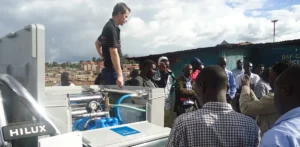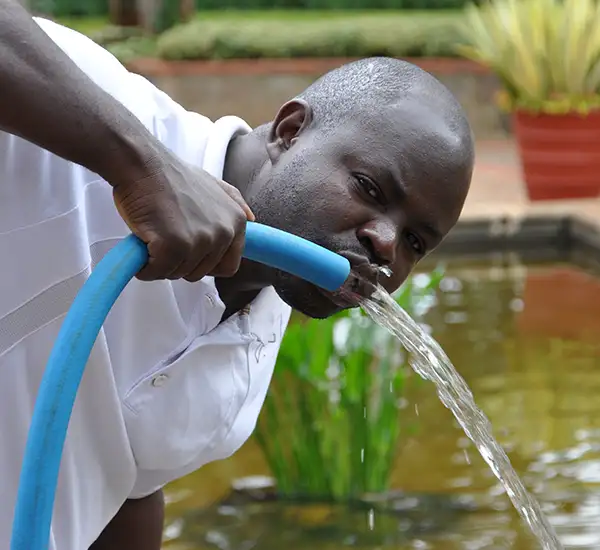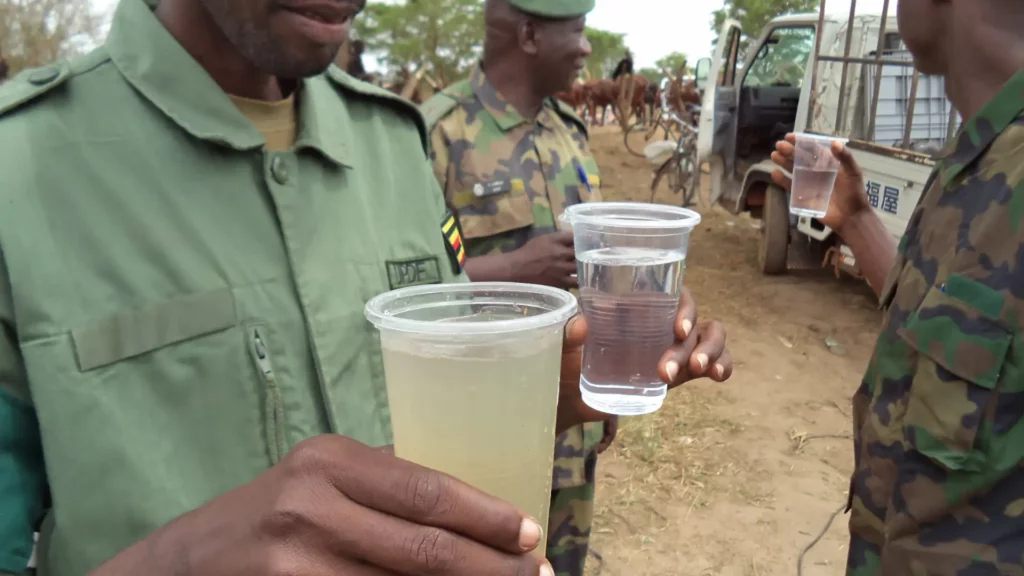
Reliable Water Solutions for Emergency Response, Military Operations, and Humanitarian Aid
Life-Saving Water Treatment: Providing Safe Drinking Water in Crisis Situations

In the aftermath of natural disasters like floods, hurricanes, earthquakes, and war, access to clean water becomes critical for survival. At MuchMoreWater, we recognize that in these emergencies, safe drinking water is a lifeline. Our mobile water purification systems are built with top-quality components, designed to be compact, lightweight, and highly efficient in providing clean water, even in the most challenging environments.

The Importance of Clean Water in Crisis: Protecting Health and Well-being
Clean water is essential for survival and plays a critical role in disaster recovery. It helps prevent deadly diseases, provides hydration and nourishment, supports medical care, ensures hygiene, and accelerates recovery. In emergency situations, clean water becomes the first line of defence. At MuchMoreWater, we are committed to delivering clean, safe drinking water through our mobile water purification systems, offering hope and healing when it matters most.”
Disease Prevention: Contaminated water can lead to life-threatening diseases, making clean water vital for health and survival.
Hydration and Nourishment: Safe drinking water is necessary for hydration and preparing food, ensuring the well-being of disaster survivors.
Medical Care: Clean water is essential for treating patients and sterilizing medical equipment in disaster-stricken areas.
Hygiene: Clean water supports personal hygiene, which is crucial for health and dignity in challenging conditions.
Recovery: Providing clean water helps restore a sense of normalcy and supports the long-term recovery process in affected areas.
Clean water for all – are you ready to make a difference? Join us in providing life-saving water solutions in the most critical situations. Explore our innovative water treatment solutions and be part of the journey that brings hope and recovery through clean water.
Military-Grade Water Treatment Solutions: Ensuring Operational Success

Mission-Critical Access to Safe Drinking Water in the Field
In military operations, access to clean and reliable drinking water is essential for both health and performance. At MuchMoreWater, we provide trusted water treatment solutions tailored for military personnel. Our mobile water purification systems are built with high-quality components, ensuring they are compact, lightweight, and highly effective in even the most challenging environments.
The Importance of Clean Water in Military Operations:
Health and Readiness: Clean water sustains operational performance and helps prevent waterborne diseases, essential in hot and demanding environments where up to 10 liters of water per day may be needed.
Logistical Efficiency: Our on-site water treatment solutions eliminate the need to transport large quantities of bottled water, improving logistics and reducing costs.
Operational Flexibility: Designed for easy deployment, our portable systems support military missions of all sizes—from small teams to large camps—ensuring access to clean water anywhere.
Why MuchMoreWater is the Trusted Choice for Mobile Water Purification Solutions
MuchMoreWater’s water purification solutions are the preferred choice for military, humanitarian, and emergency operations worldwide. Our mobile systems deliver proven performance, offering reliable water purification in over 35 countries under challenging conditions. Here’s why we are the trusted partner for clean water solutions:
Proven Performance: Our systems have a strong track record of reliability in some of the most demanding environments, providing consistent performance across +45 countries.
Rapid Deployment: We ensure fast transport and setup of our portable systems, enabling immediate access to safe drinking water in remote locations. Our systems are designed to be compact, lightweight, and easy to operate, minimizing downtime.
Safety Assurance: With stringent adherence to international water quality standards, we provide peace of mind, knowing that our systems can purify water from virtually any source, including CBRN-contaminated environments.
MuchMoreWater’s water purification technology ensures that your mission has access to reliable, safe, and clean water whenever and wherever you need it.
The Critical Importance of Clean Water: Key Global Statistics
Clean water is essential for health, survival, and development. Below are some key statistics that highlight the global need for safe drinking water and sanitation:”
Waterborne Diseases: Millions of people around the world suffer from diseases caused by unsafe water. The WHO estimates that 485,000 deaths occur annually due to diarrheal diseases linked to contaminated water and poor sanitation.
Child Mortality: Lack of clean water and sanitation is a leading cause of child mortality. UNICEF reports that about 1,000 children under five years old die each day from diarrhea caused by inadequate water, sanitation, and hygiene.
Hospitalizations: Water-related illnesses—such as diarrhea and cholera—lead to a significant number of hospitalizations each year, straining healthcare systems and resources.
Economic Impact: Poor access to clean water and sanitation has substantial economic consequences. The United Nations estimates that the lack of these services costs up to 2.5% of GDP in some developing countries, primarily due to healthcare expenses and lost productivity.
Education and Gender Disparities: In many areas, children—especially girls—spend hours collecting water for their families, limiting their access to education and reinforcing cycles of poverty.
Water Scarcity: Globally, 2.2 billion people lack access to safe drinking water, and by 2050, nearly half of the world’s population will live in water-stressed regions.
Humanitarian Crises: In natural disasters and conflict zones, access to clean water becomes even more critical. Millions of people in these crises rely on humanitarian aid for safe drinking water.
Global Goals: Ensuring access to clean water and sanitation is a key target of the United Nations Sustainable Development Goals (SDGs). Goal 6 aims to ensure universal access to safe water and sanitation by 2030.
Transforming Challenging Water Sources into Safe Drinking Water
At MuchMoreWater, we harness the power of cutting-edge Ultrafiltration (UF) and Reverse Osmosis (RO) technologies to convert even the most challenging water sources into life-sustaining potable water. Here’s how our systems can make a difference:
Lake Water:
Lakes provide valuable water resources, but they often contain organic matter, sediments, and algae. Our UF and RO systems efficiently remove these impurities, ensuring clean and safe drinking water for nearby communities.
River Water:
Rivers can be contaminated by industrial discharges, agricultural runoff, and human activities. Our advanced filtration and membrane technologies remove these pollutants, protecting the health of those relying on river water.
Borehole Water:
Borehole water often has high mineral content, making it brackish or saline. Our RO systems are designed to desalinate these sources, making the water safe for drinking, irrigation, and industrial use.
Brackish Water:
Coastal regions frequently struggle with brackish water, which is neither freshwater nor seawater. With our RO technology, we can desalinate brackish water, offering a reliable source of fresh water for these communities.
Seawater:
The oceans contain vast amounts of water, but their high salinity makes them undrinkable. Our RO technology effectively removes salt, making seawater drinkable for coastal regions and islands.
Groundwater:
Groundwater is an important source of drinking water, but it can contain harmful contaminants like arsenic, iron, and manganese. Our filtration systems effectively remove these impurities, ensuring clean, potable water.
Well Water:
Well water varies greatly in quality and may require treatment to meet drinking water standards. Our solutions ensure the safety and quality of well water for rural and suburban communities.
Rainwater:
Rainwater harvesting systems are an excellent way to collect water for drinking, but proper treatment is essential. Our purification technologies make rainwater safe for consumption.
Spring Water:
Spring water is naturally sourced, but its purity can vary. Our filtration systems ensure that spring water is treated to meet safe drinking standards.
Urban Runoff:
In some urban areas, rainwater runoff can be treated for drinking purposes. Our systems help alleviate water shortages in densely populated regions by purifying urban runoff.
Recycled Water:
In regions with advanced water treatment infrastructure, treated wastewater can be purified to potable water standards and reused for drinking purposes.
Industrial Effluent:
Industrial effluent can be treated and purified to create a safe source of drinking water, helping to address water scarcity issues in industrial areas.
Precision Filtration: Removing Contaminants at the Molecular Level
Our Ultrafiltration (UF) and Reverse Osmosis (RO) technologies are masters of precision. They target and remove molecules at the molecular level, ensuring that only pure, clean water passes through.
Ultrafiltration (UF): With UF, we capture contaminants and particles that are larger than 0.01 microns in size. This includes bacteria, viruses, suspended solids, and even some large organic molecules. UF is like a molecular sieve, allowing only water and the tiniest of molecules to permeate.
Reverse osmosis (RO): RO takes filtration to the next level, removing molecules as small as 0.0001 microns. It’s the gold standard for desalination, effectively trapping salts, minerals, and virtually all impurities, leaving you with pristine, crystal-clear water.
These technologies don’t just clean water; they transform it into a pure elixir of life. Whether it’s providing safe drinking water from challenging sources or ensuring the highest quality for industrial processes, our UF and RO systems deliver precision you can trust.
Our UF and RO systems are engineered to remove a wide range of impurities, including:
- Pathogens: Bacteria, viruses, and protozoa that can cause waterborne diseases are effectively eliminated, protecting public health.
- Suspended solids: Sediments, debris, and particulate matter are filtered out, improving water clarity and taste.
- Salts and minerals: High levels of salts and minerals can render water undrinkable and harm plumbing systems. RO removes these impurities, ensuring the water is safe and non-corrosive.
- Chemical contaminants: Pesticides, heavy metals, and industrial chemicals are effectively reduced or eliminated, minimizing health risks.
Access to clean water is a basic human right, and with our UF and RO systems, we are committed to making this right a reality for communities around the world. Clean water isn’t just a convenience; it’s a lifeline, promoting health, well-being, and prosperity.
Access to clean water is a basic human right. With our UF and RO systems, we are committed to making this right a reality for communities around the world. Clean water is not just a convenience—it’s a lifeline, promoting health, well-being, and prosperity.
Jesper Ellegaard
Rigorous Standards for Safe Drinking Water
Across the globe, strict water quality standards are implemented to ensure the safety of drinking water. MuchMoreWater’s water purification systems are designed to meet international standards and can be customized to align with local regulations to provide safe drinking water wherever it’s needed.
The World Health Organization (WHO) sets international guidelines and standards for drinking water quality, providing a framework for countries to assess and maintain safe water supplies. Our systems adhere to the WHO’s Guidelines for Drinking-water Quality to ensure the highest safety standards. Learn more about WHO’s Guidelines for Drinking-water Quality
The North Atlantic Treaty Organization (NATO) ensures that the water used by its forces, including for drinking, meets strict quality requirements. These standards align with international frameworks, such as the World Health Organization (WHO) guidelines, to guarantee safe and potable water for military personnel in the field.
In the United States, the Environmental Protection Agency (EPA) administers the Safe Drinking Water Act (SDWA), which sets Maximum Contaminant Levels (MCLs) for various contaminants. MuchMoreWater’s systems comply with these standards to ensure safe drinking water. Learn more about the EPA’s Safe Drinking Water Act
The European Union (EU) regulates water quality through the EU Drinking Water Directive, which sets comprehensive standards for microbiological, chemical, and indicator parameters. MuchMoreWater’s systems meet these EU standards, ensuring that our solutions provide safe drinking water for all citizens. Visit the European Commission’s page on Drinking Water Quality
Our Philosophy: Reliability and Ease of Use
MuchMoreWater’s water purification systems are designed for mobility, constructed with high-quality materials from trusted brands. We ensure that the units are easy to maintain and repair, with access to spare parts worldwide. Our focus on reliability and ease of use guarantees that you can trust our systems in the field.